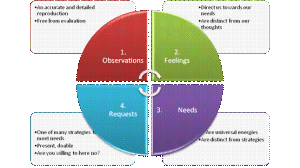
Today AmeriCorps Project CHANGE team met to get ready for the Half -Yearly Interviews scheduled for later this month. They also met Dr. Bob Anastasi, who works with the George B Thomas Learning Academy and was one of the key founders of Project CHANGE. Bob shared his experience as a principal and his work as the CEO of various non-profits and explained how Project CHANGE started. Then it was down to business.
One of the key skills of leadership is how to receive and give constructive feedback and that became the focus of the training. Mid-year evaluations can be done as a ritual that one endures, or they can be used to enhance performance for the second half of the service year. Members tried out the evaluation survey that they and the supervisor will each get, and planned how they might respond and what they might request at the meeting.
The other part of the training was taking the well known book my Marshall Rosenburg called Non Violent Communication- A Language of Life. Here members learned about the necessary distinctions between
1.Observations and Interpretations
2.Feelings and Thoughts
3.Needs and Wishes
4. Requests and Demands
We tried out some sample conversations using the model:
“When I notice you coming an hour late for our dinner date last Friday, ( Specific Observation)
I felt angry and frustrated ( the Feeling)
because I need to know my time and your time is respected, since we are both so busy, ( the Need) and so can I ask you in future, if you know you are going to be late, can you call me ahead of time so I don’t overcook the chicken or worry that you have had an accident.” (The Request, not the Demand.)
Rosenberg argued that all conflict happens because we miscommunicate our legitimate human needs. We tend to confuse facts with feelings, and requests with demands. We try to make others responsible for our feelings and abdicate the adult role which is to know what you need and take action to have them met. When we say, “You make me so angry because you are not listening,” we are making someone else responsible for how we feel. Not only is that a vital surrender of power, it is also the first step to protracted conflict. Members were encouraged to be the chief advocates for their own needs, because unless they are competent in meeting their own needs, they can hardly be totally adept at meeting other people’s needs. One must never confuse the two, and one must never allow the second to be the excuse for neglecting the fair demands of the first. Service may be unselfish but it cannot be at the price of sacrificing the essentials.
We also tried to expand the conversation about the second half. If the first 6 months of service has been perfect, then that does not leave any room for growth or experimenting. Members were encouraged to formulate a request for their supervisor that would build on what they learned so far, and help the supervisor better support the ongoing work of each AmeriCorps member. Some wanted more understanding of other parts of the Non Profit organization, such as budget and policy, and others want to ask for more structure or clearer communication of expectations. Whatever the request, I am sure that our partners will continue to enhance the Project CHANGE member’s experience, and make it even more memorable.
